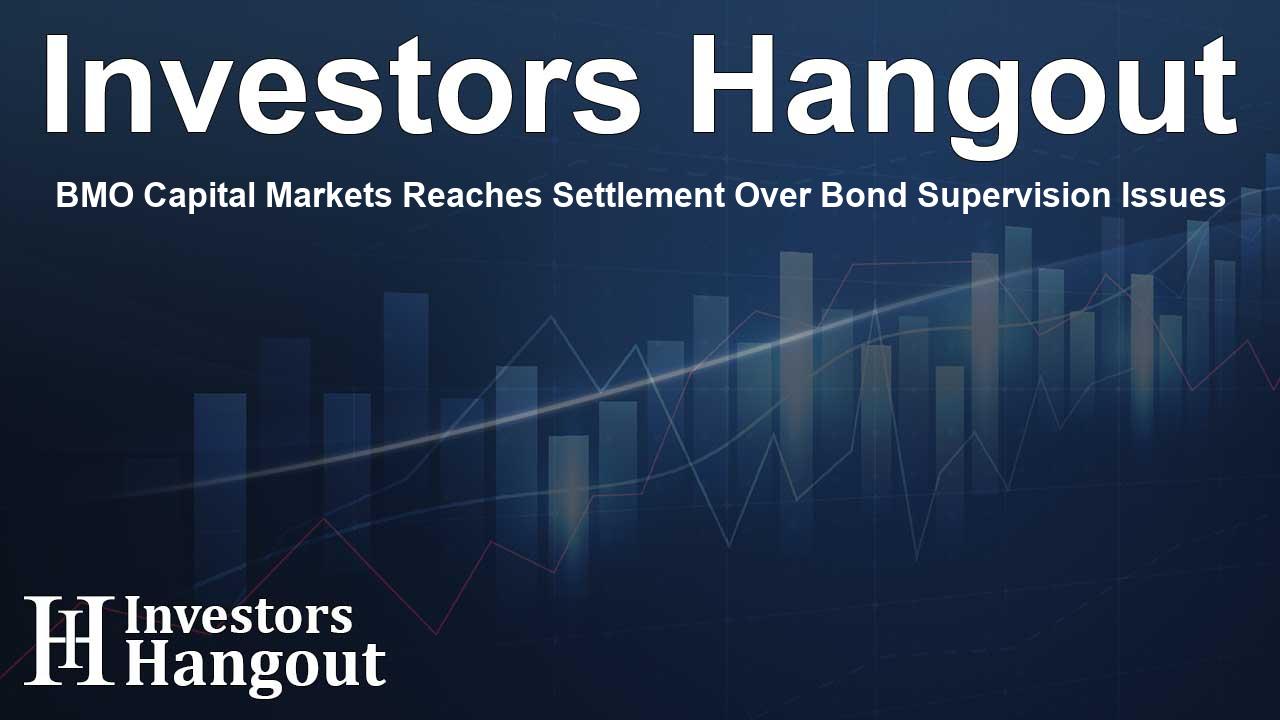BMO Capital Markets Reaches Settlement Over Bond Supervision Issues

BMO Capital Markets Settles SEC Charges
BMO Capital Markets has made headlines recently with a significant settlement amounting to over $40 million with the U.S. Securities and Exchange Commission (SEC). This settlement addresses serious charges alleging that the firm did not adequately supervise its employees involved in the sale of mortgage-backed bonds.
Details of the Settlement
The settlement encompasses a variety of financial penalties. This includes disgorgement, which is the repayment of ill-gotten gains to prevent unjust enrichment. Additionally, prejudgment interest, as well as a civil penalty, are part of the overall financial resolution endorsed by the SEC.
While BMO Capital Markets has agreed to these terms, it is important to note that the firm has neither admitted nor denied any wrongdoing in this agreement. This lack of admission is a common practice in settlements like these, where organizations seek to avoid the expense and reputational damage of prolonged litigation.
Impact on BMO Capital Markets
This settlement could have implications for BMO Capital Markets in terms of its operational focus and governance. The necessity for strict supervision of trading activities provides a wake-up call to many financial institutions regarding the importance of regulatory compliance.
BMO’s settlement is a part of a broader trend where financial institutions are held accountable for oversight failures. Regulators are increasingly emphasizing the need for robust internal controls concerning the sale of complex financial products, like mortgage-backed securities.
Future Regulatory Expectations
The SEC's actions send a clear message to the financial industry: all firms must be proactive in implementing sufficient supervisory measures. In this rapidly evolving financial landscape, firms must be vigilant in monitoring their employees' activities, especially in high-stakes environments where significant financial risks are involved.
In light of these recent developments, BMO Capital Markets and similar institutions may need to reassess their compliance frameworks and ensure that sufficient resources are allocated towards regulatory adherence and employee training.
Frequently Asked Questions
What prompted BMO Capital Markets to settle with the SEC?
BMO Capital Markets settled with the SEC over allegations of inadequate supervision of employees involved in selling mortgage-backed bonds.
How much did BMO Capital Markets agree to pay?
BMO Capital Markets agreed to pay over $40 million as part of the settlement to the SEC.
Did BMO Capital Markets admit any wrongdoing in the settlement?
No, BMO Capital Markets did not admit or deny any wrongdoing as part of the settlement agreement.
What does the settlement include?
The settlement includes disgorgement, prejudgment interest, and a civil penalty, reflecting the serious nature of the charges against BMO Capital Markets.
What are the implications of this settlement for BMO Capital Markets?
The settlement may require BMO to enhance its internal compliance and supervisory controls moving forward as part of ongoing regulatory expectations.
About Investors Hangout
Investors Hangout is a leading online stock forum for financial discussion and learning, offering a wide range of free tools and resources. It draws in traders of all levels, who exchange market knowledge, investigate trading tactics, and keep an eye on industry developments in real time. Featuring financial articles, stock message boards, quotes, charts, company profiles, and live news updates. Through cooperative learning and a wealth of informational resources, it helps users from novices creating their first portfolios to experts honing their techniques. Join Investors Hangout today: https://investorshangout.com/
Disclaimer: The content of this article is solely for general informational purposes only; it does not represent legal, financial, or investment advice. Investors Hangout does not offer financial advice; the author is not a licensed financial advisor. Consult a qualified advisor before making any financial or investment decisions based on this article. The author's interpretation of publicly available data shapes the opinions presented here; as a result, they should not be taken as advice to purchase, sell, or hold any securities mentioned or any other investments. The author does not guarantee the accuracy, completeness, or timeliness of any material, providing it "as is." Information and market conditions may change; past performance is not indicative of future outcomes. If any of the material offered here is inaccurate, please contact us for corrections.